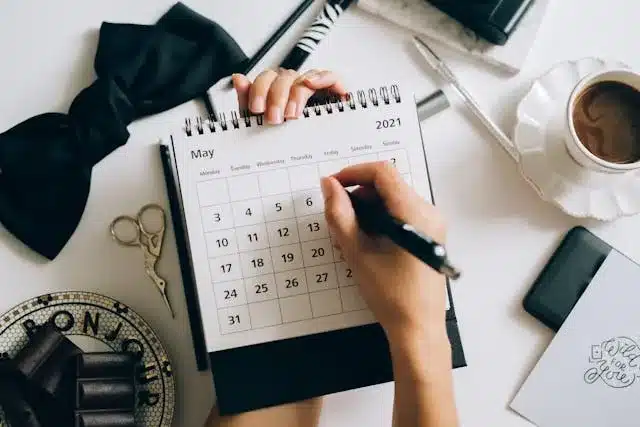Are you ready to uncover personal secrets of a writer’s daily routine for inspiration. What is it like in a day in the life of a writer for creativity?
Speaking from much experience, having a writer’s daily routine for inspiration aims to help you build your skills and become more effective and creative as a writer.
With that said, I’m inviting you into my world by sharing a glimpse into my daily writing routine.
As writers, we often work in solitude, but behind the scenes, there’s a unique rhythm and flow that shapes our creative process.
This post aims to provide insight into the real-life challenges and successes that I, like many writers, experience every day.
Anyway, I hope this glimpse into my routine will offer some inspiration and perhaps even some relatable moments for you.
Without wasting much time, here’s my daily writer’s routine for inspiration:
Inspiration for My Morning Routine Daily for Writer’s: Setting the Stage
My day typically begins around 7:00 AM.
I believe starting the day with a sense of calm is essential to get the creative energy flowing.
Also, I’ve realized over time that how I start my morning determines how productive and inspired my writing session will be.
Whether it’s the warmth of the sun filtering through the blinds or the quiet hum of the early day, I’ve learned that stillness helps ideas surface.
After making a cup of coffee, I spend about 30 minutes doing something other than writing.
Often, this includes journaling in Day One or reading something motivational, like a short essay from Brain Pickings.
Other times, I take a short walk to spark curiosity through my surroundings.
Around 7:30 AM, I’m at my desk. My workspace is simple yet effective, a clutter-free desk, a comfortable chair, and a good source of natural light.
I keep a few printed quotes by writers I admire, like Octavia Butler and Stephen King, to keep me anchored when doubts creep in.
Additionally, I find that starting my day by reviewing my notes or a rough outline from the previous day helps ease me into the day’s writing session.
For My Mid-Morning: Diving into the Writing Process
By 8:00 AM, I’m fully immersed in my first writing block. This is when I feel the sharpest. I treat it like my creative “deep work” time.
In my writing process, I use the Pomodoro technique, working for 25 minutes and taking a short 5-minute break in between. It helps to stay focused and prevent burnout.
During this block, I usually start by reading what I wrote the day before. This helps me get back into the headspace of my current project, and I often use this time to make some small edits.
Then, I move onto writing new material. I might be working on a new chapter, developing a character, or brainstorming plot ideas.
Sometimes, I use AI brainstorming tools like ChatGPT to push through early morning creative fog.
Some days, the words flow effortlessly; other days, I find myself staring blankly at the screen, wrestling with writer’s block.
When that happens, I’ve learned to step back rather than push through, it helps prevent burnout and frustration.
See How to Overcome Writer’s Block with Tips: Strategies That Work.
During My Lunch Break: Recharge and Reflect
Around 10:00 AM, I take a longer break for lunch and try to step away from my workspace. This isn’t just a break for my body, it’s a reset for my brain.
I either go for a quick walk, listen to a podcast, or read something unrelated to writing.
Lately, I’ve been enjoying “The Writer Files” podcast by Kelton Reid.
It’s packed with tips and insights from authors across genres.
These activities help me reset and approach my work with a clearer perspective when I return.
In the Afternoon: Edit and Refine
In the afternoon, my focus shifts to editing and refining my work. I usually spend about two hours reviewing and editing the day’s writing.
This time is spent correcting any grammatical or spelling errors, improving word choices, and adjusting the flow and tone. I often use Grammarly for line edits and ProWritingAid for deeper structure checks.
I find it helpful to read my work out loud to catch mistakes that I might miss when reading silently. Plus, reading aloud lets me hear the rhythm and tone, making sure it sounds authentic.
During Late Afternoon: Planning and Research
By late afternoon, I transition to planning and research. This is the part where curiosity leads the way.
I dedicate this time to thinking about the direction of my writing projects, noting any new ideas that might have come to mind, and conducting research for any projects that might need further details.
Normally, I use a Notion board to organize my ideas and references, and I subscribe to newsletters like The Creative Independent for ongoing inspiration.
And sometimes, I use this time to catch up on industry news or read resources related to my writing craft.
In the Evening: Wind Down
I typically wrap up my day around 5:00 PM so that I can have the evening free for family, friends, or a personal activity.
Moreover, I may do a final review of my notes and plan for the next day. I may also use this time to journal or indulge in some creative reading.
One of my favorite rituals is reading one short story or essay before bed, it’s like tucking my creativity in for the night.
Challenges and Successes
As a writer, my daily routine is a mix of triumphs and struggles. I’ve had mornings where I knock out 1,500 words before 10 a.m., and others where I barely make it through a paragraph.
There are days when the words flow smoothly and I feel a great sense of accomplishment, while other days are filled with self-doubt and writer’s block.
Over time, I have come to accept the ups and downs of the creative process, and to rely on a routine to keep myself grounded.
Your rhythm might look different, and that’s okay. What matters most is building habits that support your creative energy rather than deplete it.
If you’re seeking support and community in your writing journey, consider joining the Writer’s Growth Academy.
Contact us on WhatsApp.
Share Your Writers Daily Routine for Inspiration
What does your daily routine look like?
Share your experiences and tips in the comments below.
READ ALSO:
Writing Prompts for Creative Inspiration this Week
Writer’s Interview for Inspiration: Insights from a Creative Journey
Storytelling Book Review for Writers: Story Genius by Lisa Cron
Music Production Basics: How to Start Making Beats at Home



